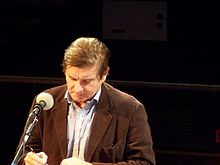Éric Neuhoff: Difference between revisions
Content deleted Content added
→References: remove category using AWB |
journalist at Quotidien de Paris |
||
| Line 11: | Line 11: | ||
| movement = Néo-hussard |
| movement = Néo-hussard |
||
}} |
}} |
||
'''Éric Neuhoff''', born 4 July 1956, is a French novelist and journalist. He debuted in 1982 and used a style nicknamed "néo-hussard", after the [[Hussards (literary movement)|Hussards]] movement of the 1950s. He thus became associated with writers such as [[Denis Tillinac]], [[Patrick Besson]] and [[Didier Van Cauwelaert]], who debuted around the same time and used a similar style. He received the 1990 [[Roger Nimier Prize]], and has received awards such as the [[Prix des Deux Magots]], [[Prix Interallié]] and [[Grand Prix du roman de l'Académie française]].<ref name=corty>{{Cite news|last=Corty|first=Bruno|date=2014-10-01|url=http://www.lefigaro.fr/livres/2014/10/01/03005-20141001ARTFIG00238-eric-neuhoff-prince-de-monaco.php|title=Éric Neuhoff, prince de Monaco|language=French|work=[[Le Figaro]]|accessdate=2015-01-07}}</ref> |
'''Éric Neuhoff''', born 4 July 1956, is a French novelist and journalist. He debuted in 1982 a a journalist at '' [[Le Quotidien de Paris]]'' and used a style nicknamed "néo-hussard", after the [[Hussards (literary movement)|Hussards]] movement of the 1950s. He thus became associated with writers such as [[Denis Tillinac]], [[Patrick Besson]] and [[Didier Van Cauwelaert]], who debuted around the same time and used a similar style. He received the 1990 [[Roger Nimier Prize]], and has received awards such as the [[Prix des Deux Magots]], [[Prix Interallié]] and [[Grand Prix du roman de l'Académie française]].<ref name=corty>{{Cite news|last=Corty|first=Bruno|date=2014-10-01|url=http://www.lefigaro.fr/livres/2014/10/01/03005-20141001ARTFIG00238-eric-neuhoff-prince-de-monaco.php|title=Éric Neuhoff, prince de Monaco|language=French|work=[[Le Figaro]]|accessdate=2015-01-07}}</ref> |
||
He has worked as a journalist and film critic for [[France Inter]], [[Canal+ Cinéma]] and ''[[Madame Figaro]]''.<ref name=corty /> He co-wrote the screenplay for the 2001 film ''[[Savage Souls (film)|Savage Souls]]'', directed by [[Raúl Ruiz (director)|Raúl Ruiz]].<ref>{{Cite web|url=http://www.allocine.fr/film/fichefilm_gen_cfilm=29217.html|title=Les Âmes fortes|language=French|work=[[AlloCiné]]|accessdate=2015-01-07}}</ref> |
He has worked as a journalist and film critic for [[France Inter]], [[Canal+ Cinéma]] and ''[[Madame Figaro]]''.<ref name=corty /> He co-wrote the screenplay for the 2001 film ''[[Savage Souls (film)|Savage Souls]]'', directed by [[Raúl Ruiz (director)|Raúl Ruiz]].<ref>{{Cite web|url=http://www.allocine.fr/film/fichefilm_gen_cfilm=29217.html|title=Les Âmes fortes|language=French|work=[[AlloCiné]]|accessdate=2015-01-07}}</ref> |
||
Revision as of 14:04, 16 January 2016
 Neuhoff in 2012 | |
| Born | 4 July 1956 |
| Occupation | Novelist, journalist |
| Literary movement | Néo-hussard |
Éric Neuhoff, born 4 July 1956, is a French novelist and journalist. He debuted in 1982 a a journalist at Le Quotidien de Paris and used a style nicknamed "néo-hussard", after the Hussards movement of the 1950s. He thus became associated with writers such as Denis Tillinac, Patrick Besson and Didier Van Cauwelaert, who debuted around the same time and used a similar style. He received the 1990 Roger Nimier Prize, and has received awards such as the Prix des Deux Magots, Prix Interallié and Grand Prix du roman de l'Académie française.[1]
He has worked as a journalist and film critic for France Inter, Canal+ Cinéma and Madame Figaro.[1] He co-wrote the screenplay for the 2001 film Savage Souls, directed by Raúl Ruiz.[2]
Works
- 1982: Précautions d'usage, La Table Ronde
- 1984: Un triomphe, Olivier Orban
- 1984: Nos amies les lettres, Olivier Orban
- 1986: Des gens impossibles, La Table Ronde
- 1987: Lettre ouverte à François Truffaut, Albin Michel
- 1989: Les Hanches de Laetitia, Albin Michel, Roger Nimier Prize 1990
- 1992: Actualités françaises, Albin Michel
- 1992: Comme hier, Albin Michel
- 1993: Pas trop près de l'écran (with Patrick Besson), Le Rocher
- 1994: Michel Déon, Le Rocher
- 1995: Barbe à papa, Prix des Deux Magots
- 1997: La Petite Française, Prix Interallié
- 1998: Champagne !, Albin Michel
- 1998: La Séance du mercredi à 14 heures, La Table Ronde
- 2001: Un bien fou, Albin Michel, Grand Prix du roman de l'Académie française
- 2003: Histoire de Frank, Fayard
- 2006: Quand les brasseries se racontent, Albin Michel
- 2007: Pension alimentaire, Albin Michel
- 2009: Les Insoumis, Fayard
- 2012: Mufle, Albin Michel, Prix Trop Virilo 2012
References
Wikimedia Commons has media related to Éric Neuhoff.
- ^ a b Corty, Bruno (1 October 2014). "Éric Neuhoff, prince de Monaco". Le Figaro (in French). Retrieved 7 January 2015.
- ^ "Les Âmes fortes". AlloCiné (in French). Retrieved 7 January 2015.
